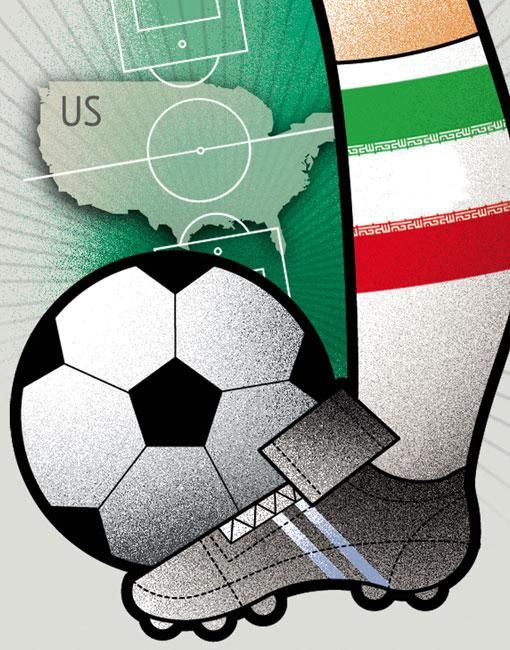For Richard Nixon, it was ping-pong diplomacy with China, and for Mahmoud Ahmadinejad, it may well be football with the United States. According to press reports, Persepolis and Esteghlal Tehran, two of Iran's major soccer clubs, were planning several matches in American cities with large ethnic Iranian populations, including Los Angeles and Washington, DC. Will this elegant sport set the stage for improved relations between the two countries?
Because Iranian-American ties were strained after the 444-day hostage crisis (1979-1981), which coloured every administration's outlook ever since, observers concluded that the two countries were on an eventual collision course. Iran's political reach throughout the Arab and Muslim worlds, its support of movements like Hamas and Hezbollah (perceived as "terrorist" organisations by Westerners in quest of enemies), along with an avowed hostility towards Israeli excesses as well as sustained nuclear programmes that may in time equip Tehran with weapons of mass destruction, all colour the perception that many have of the Islamic Republic.
To reduce tensions and mitigate an obvious escalation, President Barack Obama extended an olive branch to the Islamic Republic, by praising its "great civilisation" and past "accomplishments" that, allegedly, "earned the respect of the United States and the world". Even if the message was timed to the Persian New Year's celebration of Nowruz, a secular holiday that the late Ayatollah Ruhollah Khomeini - and both his successor Ayatollah Ali Khamanei and President Ahmadinejad - tried to ban because of its pre-Islamic values, Obama made a significant gesture.
In response, Iran's Supreme Leader offered a near instantaneous rejoinder that claimed the American President "insulted the Islamic Republic of Iran from the first day."
Khamanei asked where was the change Obama touted when sanctions remained in place and, even worse, when Washington insisted that Iran could not possibly assume its responsibilities "through terror or arms, but rather through peaceful actions that demonstrate the true greatness of the Iranian people and civilisation." In what was probably the single most important line in his address, Obama even defined "the measure of that greatness," claiming that it was not a "capacity to destroy," but an Iranian demonstration of an "ability to build and create." Logically, such an assertion applied to every country, including established nuclear powers.
Though difficult to determine, Ayatollah Khamanei's riposte to Obama was probably based on an Iranian conclusion that the US invitation to dialogue was to satisfy an American need, rather than any intrinsic desire to forge a fresh path with Tehran. Khamanei, and not Ahmadinejad as it is often assumed, remained the single most critical Iranian official and he seldom displayed a longing to oblige Washington. Consequently, the cleric marked his statement with a specific need for reciprocity, committing his country to "change its behaviour" if and when Washington did likewise.
To be sure, the new tone in Washington abandoned the axis of evil epithet, as well as the previous administration's advocacy for regime change in Iran. While Washington and its European allies called on Iran to suspend its nuclear enrichment programme, and while most Western powers extended existing sanctions, Obama called on Tehran to "unclench its fist." Remarkably, Khamanei was now on record to consider such a policy, provided Washington unclenched its own fist and, from an Iranian perspective, recognise Iranian hegemonic aspirations.
Improved American-Iranian ties will naturally be opposed by Israel, which perceives any rapprochement as detrimental to its monopoly of nuclear weapons in the Middle East. Not surprisingly, Israel will continue to insist that American relations with Arab and Muslim countries go through its prism. In fact, Israel will demand "guarantees" that any dialogue with Tehran would not be at the expense of Israeli interests, which Washington will most certainly accommodate.
Still, successive Israeli and American governments agreed that a putative Iranian "bomb" would be unacceptable, though chances are excellent that Iran will become a nuclear power on Obama's watch. It may be worth recalling that nuclear weapons are not just about capabilities but about prestige and that is precisely what Iran is after.
Under the circumstances, and in the words of Mohsin Reza'i, a former revolutionary guards commander and secretary of the powerful expediency council, Ayatollah Ali Khamanei relied on a sport analogy to return "a long shot to Obama." The well-connected Reza'i asked on the Tabnak website, whether Washington was ready to change its own rhetoric and wondered whether Iran ought to "chose football, in which it is skilled and privileged?"
Ayatollah Khamanei delivered a carefully crafted address with few America-bashing rhetoric. Since he essentially welcomed Obama's offer for talks if set within clearly defined parameters, it may be prudent for Washington to facilitate matches between, and with, Persepolis and Esteghlal Tehran on its soil. Such opportunities will allow the American public to rediscover Iranians just as the latter discerned American values when wrestlers, or leading figures from the Academy of Motion Picture Arts and Sciences in Hollywood, represented their country in Iran.
If Americans and Iranians learn to compete on the soccer field, chances are excellent that the two countries will avoid military confrontations, which would also mean that Obama's call for engagement was not in vain.
Dr. Joseph A. Kechichian is a commentator and author of several books on Gulf affairs.
Your comments
I for one hope that the United States and Iran can quickly improve relations. Mistakes were made by both sides but it is time to apologise and move forward. There are many areas of common interest between the two countries. Reestablishing tourism and trade would go a long way to clear up the misperceptions that have developed over the past 30 years. It is time that we moved toward a saner world where countries with differences can find areas of common ground and respect each other. I am very hopeful that this long outstanding issue will be resolved in the coming months and years.
Michael
San Francisco,US
Posted: March 26, 2009, 09:03










